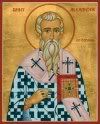So I watched Kingdom of Heaven last night... The first I knew of this movie was when I saw a poster in Russia...so I thought it was a Russian movie, especially with a title like "Kingdom of Heaven"; as usually when I see the Russian words "kingdom" and "heaven" it's in liturgical texts... But i digress from the scathing review... Going into the movie all that I knew was that it was about the Frankish crusades. From the get-go I learned that one went to Jerusalem to find forgiveness (through bloodshed) which Orlando's character desperately needed as he had just killed a priest for insulting his dead wife... [You can see the obvious failure of the Frankish itemization of sins and their following penances.] Throughout the movie we learn that the (good) main characters are more about 'spirituality' than 'religion'...In the words of my brother, "I didn't know they were such liberal thinkers..." As usual the portrayal of Islam is a conciliatory one; it comes out (over all) as truly peace-loving and merciful. Saladin in the end allows Jerusalem to surrender and all its occupants to be peacefully escorted to the sea. We read from history the true account:
Saladin had taken counsel and laid down these ransom terms for the inhabitants of Jerusalem: each male, ten years old and over, was to pay ten besants for his ransom; females, five besants; boys, seven years old and under, one. Those who wished would be freed on these terms and could leave securely with their possessions. The inhabitants of Jerusalem who would not accept these terms, or those who did not have ten besants, were to become booty, to be slain by the army's swords.
On the second disk of the movie there were several tv segments-one from the history channel and one from A & E. The history channel segment examined what was "history" and what was "hollywood". This cleared up the gist of the story (even with their annoying presentation). However, here are some gems from the A & E movie reel: [the crusades were] "about being bloodthirsty and not being tolerant at all" - Eva Green, co-star; from the narrator:
"Crusaders were the hero's of medieval Europe; but for modern audiences the crusades are far from a noble endeavor. For us they exemplify intolerance not virtue. [the movie is] about the triumph of dialogue over war, about the possibility for peace even in the most divided land. Ultimately it is a film that asks us to look to the distant past in order to imagine a different future."
From this I learned that intolerance is the opposite of nobility and virtue and tolerance is the highest virtue...hmm...lets have a word now from G.K. Chesterton: "Tolerance is the virtue of a man without convictions." We move through tolerance to the social gospel: "…the story of…men whose faith was tempered with tolerance. Noble men who sought a kingdom of heaven here on earth." What I find strange about both of these segments was that there were only about four instances when they talked about any Muslim aggression. The Islamic prerogative to kill infidels was never mentioned whereas the "Christian" prerogative was throughout. So in the end I liked it...because it gives me something to rant about.


No comments:
Post a Comment